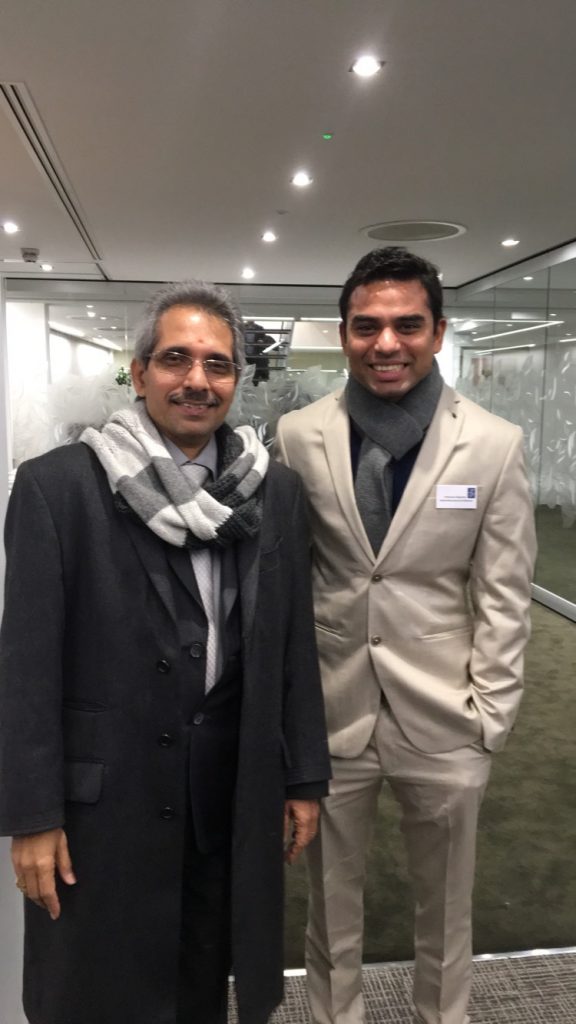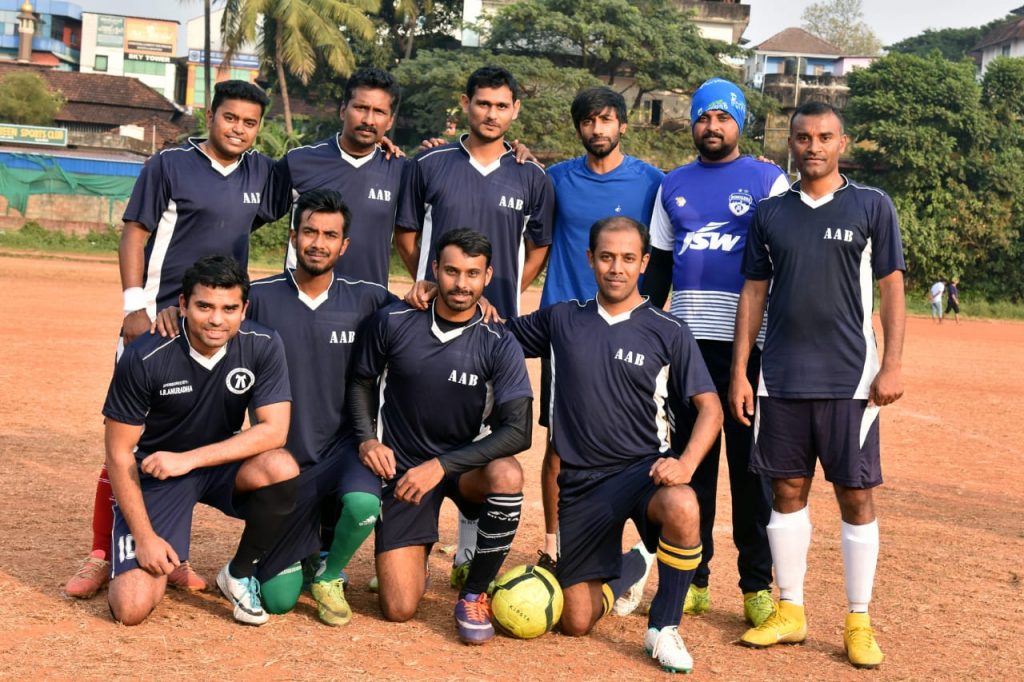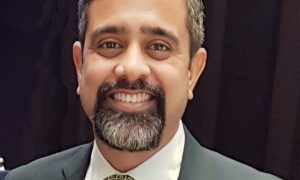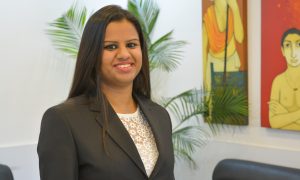VISHWASAI RAJENDRA, IN-HOUSE LEGAL COUNSEL AT HSBC ON MAKING A CAREER IN LAW, HIS EXPERIENCE IN CORPORATE AND COMMERCIAL LAWS AND WORKING AS AN IN-HOUSE COUNSEL

This interview has been published by Maaz Akhtar Hashmi and The SuperLawyer Team. The Interview was taken by Priyanka Cholera.
You have various roles and achievements credited to your name, from working with Lakshmikumaran & Sridharan, Aarna Law, King & Partridge, to being an In-house Counsel at HSBC. Apart from what makes headlines, what would you like our readers to know about you?
I believe my journey so far is filled with highs and lows, acceptances and rejections and good and bad days, but every single event has definitely contributed to it. Apart from being a passionate footballer and football fan and a topper in law college, my legal journey includes various shifts from a Tier 1 law firm to a boutique law firm, from senior designations within the organization, to being the youngest legal head of a Company, to starting off from scratch, from tax laws to corporate and commercial laws and from a fintech startup to a Global Bank. I was also blessed with the opportunity to work with two of the greatest legal minds in the industry, my forever mentors and well-wishers, Mr. KP Kumar (Senior Counsel) and Mr. G Shivadas (Senior Counsel).
I think it’s important for people in the field to know that one’s achievements/experience should never be defined by designations or places of work, rather by the things they have learned along the way (both about law and life), the people they have met and learnt from, the mentors they can look up to and the impact they have had on the people they have worked with.
Having studied law at MS Ramaiah Law College, you established a keen interest in Corporate Law., what drew you towards making a career in law?
I am a first-generation lawyer coming from a very traditional Indian family who believed (at the time) that the only way to make a career and name for yourself was to take up engineering. In fear of disappointing my family, I pursued science in 11th and 12th and even did a year of B.sc post that. It was during this year that I realized that I wanted to be part of a profession where I would be making a difference each day and would stand out from the crowd. At this point, I met a few lawyers who gave me a lot of insight into how the industry functions and from the get-go, it had my attention. It is one of the hardest decisions to leave a course by choice and pursue something completely new and different. There is no way to be completely sure, but you have to believe and listen to that inner voice and follow your instinct. When I took this step, I knew that I had to outperform myself to prove that I made the right decision, and it introduced me to a whole new side of myself. I worked harder than ever before and topped my course. But the best part? I enjoyed every minute of it and met some great friends along the way.
You pursued an LLM in Corporate & Competition Law from Durham University. Could you please tell our readers how the international exposure has helped you gain perspective to improve your skills in the legal field?
International experience is something I would always recommend. Apart from the course structure itself, it is the style of teaching and method of examinations which is something I had never experienced before. It gives you a more holistic view of the subject and helps you think outside the box. It is not just limited to topics which you may study from a textbook and also vastly improves your research skills. This really helped me during my work as I started to think outside the normal course of the law and started to question judgements, articles and the applicability of certain laws itself. Also, my method of research changed vastly, and it was no longer limited to just textbooks, bare acts and case laws, but moved to commentaries, articles on the subject etc., to understand the history and different opinions on the point before I could form my own.

What are the most important things that students pursuing their LLM abroad should keep in mind?
To start off, I would say that it is always better to work for a year or two before pursuing an LLM. This not only gives you work experience but changes the experience of your LLM completely. Your outlook on the subject increase, and you are also able to apply what you have learnt from your previous work experience to excel in your LLM. This also helps while applying for a job abroad, as prior work experience in the field is always an added advantage.
I believe that the overall experience of studying abroad is sometimes lost among students due to the pressure of having to find a job abroad as soon as possible. This makes them miss the little joys and experiences of day-to-day life, which goes a long way in shaping perspective, people skills and attitude – critical for a lawyer! Therefore, my second advice to students would be to make the most of each day. Enjoy the experience, take part in as many extracurricular activities, meet and speak to as many foreign students as possible and make the most of your time abroad.
You started your legal career with Lakshmikumaran and Sridharan (L&S) as an Associate immediately after law school. How has that experience shaped you and contributed to your interest in Corporate & Commercial Laws?
This is actually a very interesting question as L&S had a huge role to play in many career decisions I took. I started my career as an Indirect Tax litigator, working under the smartest Indirect Tax lawyers in the Country. I adapted quickly to the pressure of being in a Tier 1 law firm and started to enjoy the overall experience of finally applying to practice what I had learnt for 5 years in law school. Everything was a new experience. From your first case and client to your first mistake, your first victory in the legal profession, your many defeats which teach you so much, watching your seniors argue and trying to replicate their mannerisms while you argued etc. was such a great and cherishing experience, and when I look back on it now, it paved such an important path to the professional I am today.
At the same time, I wanted to gain experience in different laws and sectors. Since I started off with Tax, I wanted to explore other Corporate and financial laws so as to expand my legal knowledge and horizon. This led me to pursue an LLM in Corporate and Competition Law in the United Kingdom. Upon completion of my LLM, I returned to L&S for a short period before eventually moving out to gain more experience in Corporate and Commercial laws.
You recently joined HSBC as a Counsel providing Global Legal Services to the clients. Could you explain what kind of work an In-house Counsel entail?
Initially, it was a huge change for me, moving from litigation and advisory role in a law firm to an in-house legal team of a Company. The structure of an in-house role is designed in such a way that your clients are the other teams within the same organization, and there are a lot more processes to follow. You need to provide efficient and timely support to your internal stakeholders to ensure the smooth running of the business. It also involves a lot of negotiation and consultation with other in-house Counsels from different Corporates, along with awareness and knowledge of all laws and the constant changes to them.
Currently, at HSBC, I draft and negotiate derivative contracts with our Clients across the world. This was a completely new sector for me and the opportunity to learn something which I had never done in the past. This is what excited me the most, as I always wanted to learn more than just one kind of law. Working in a Global Bank comes with its own excitement and challenges. You get to learn a lot about the Global financial market and the laws regulating the same. It requires a lot of hard work, uneven hours, and it requires you to think on your feet. Everyday is a challenge and an opportunity to learn something new from immensely talented lawyers all over the world. It broadens your entire legal horizon as it gives you Global exposure and gets you used to a tried and tested process.

Your practice areas include Fintech Law, Regulations governing NBFC’s, Corporate and Commercial advisory and litigation, Contract Management, Civil and Commercial Litigation, Dispute Resolution, Arbitration, Consumer Disputes, Corporate and Tax litigation and advisory. Which area, according to you, interests you the most and why?
Having started off with Tax law and having learnt Tax from 2 of the most prominent Senior Counsels in the field i.e Mr. KP Kumar and Mr. Shivadas, I believe that I will always have a soft corner for Tax. Arguably, Tax law is one of the toughest laws in the Country and learning to interpret Tax law always gives you the advantage while interpreting or understanding any other law.
Having said that, I absolutely enjoy what I am doing today, and every law I have practiced in the past has given me a different insight into the profession. Although I do advocate specialization in the field of one’s choice, I do believe that one should get their feet wet in a few areas of law before deciding what they want to excel in.
The pandemic has completely changed the ways industries operate. Will the face of the legal sector undergo a drastic change, keeping in view the challenges entailed by the pandemic?
When it comes to litigation, I believe that physical hearings will always be more prominent than virtual hearings, and I trust that virtual hearings may never fully replace physical hearings. Although virtual hearings did have a positive side as much as one could attend hearings in different cities, from their home or office, I do believe that physical hearings can never and will never be replaced. Therefore, other than E filing of documents, I don’t think there will be a drastic change in the field of litigation.
With non-litigation roles, however, I do think that there will be a drastic change as far as work from home is concerned. I believe more and more companies and firms are switching to a hybrid work from home model, which I believe to be very successful.
Being extremely busy working in a corporate setup, how do you take care of your mental health and strive towards a good work-life balance?
Mental (and physical) health is a growing concern all over the world, and rightly so. I try to take care of my mental and physical health by keeping fit, spending time, and travelling with family and friends.
I always was and still am very passionate about sports, especially football and badminton, and I make sure that I have time to play them both at least once a week. In fact, I still enjoy playing competitive football and recently also represented the Advocates Associate Bangalore in the inter bar association tournament.
I think it is more and more important for organizations to understand the importance of the mental and physical health of their employees and take active measures to ensure that each one of them focuses on the same. However, more than the organization, it is also equally important for each individual to understand the importance of this, to make time to do what they always loved and speak out whenever something is bothering them.
Would you like to accord our readers with any further suggestions?
The legal profession is a roller coaster, and there will always be ups and downs. Try to stay positive through the entire journey, and life will always find a way. Don’t let rejections get you down. Never be afraid to make a shift and trust your instinct. Work hard but also try to enjoy a bit in the process. Most importantly, never let any person or organization change or hamper your identity.
Get in touch with:

























